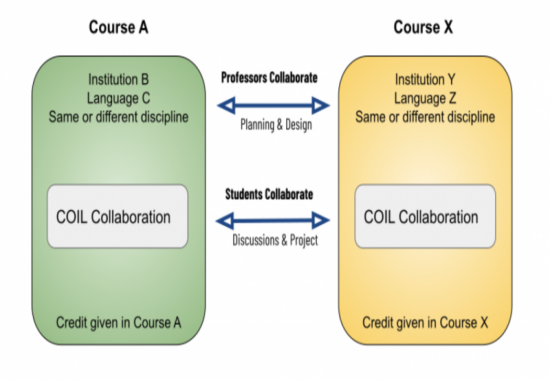COIL
“COIL” (Collaborative Online International Learning) at Stan
State helps to support and enhance the achievement of
global/transnational engagement goals, through online,
collaborative course projects with international partners. The
COIL model capitalizes on the myriad tech tools available for
online teaching and learning to connect students at separate
campuses for shared course projects and assignments. COIL
activities offer meaningful and authentic international,
intercultural, and sometimes interdisciplinary learning
experiences in support of course and institutional learning
outcomes without requiring international travel. COIL provides an
opportunity to share our faculty expertise, incredible students,
and regional/national resources with curricular partners around
the world.
The COIL model of virtual exchange was developed at the State
University of New York (SUNY), and we draw upon their model for
our program at Stan State. We also draw up resources obtained
through Florida International University’s COIL Virtual Exchange
Leadership Institute, and through our memberships in the SUNY
COIL Global Network and the Latin American COIL Network.
Why Engage in International/International Projects?
At Stan State, our Strategic
Plan and Statement
on Diversity, Equity, Inclusion, and Social Justice call
upon the university to offer learning experiences that enhance
cultural awareness and understanding, and that develop the
knowledge and skills needed to be responsible global citizens.
COIL supports our General
Education Program Goals and Outcomes by promoting
awareness of multicultural perspectives, and the ability to
“identify and analyze problems within local, regional, national,
and/or global contexts.” COIL also supports the Graduate
Student Learning Goals by promoting “knowledge of diverse
perspectives and broader contexts as appropriate to the
discipline.” The
University’s Strategic Plan calls for students to have
experiences with High
Impact Practices, and COIL projects typically involve
collaborative assignments and projects with an emphasis on
diversity/global learning and may involve additional HIPs as
appropriate to course learning outcomes. As International
Education and Global Engagement reminds us, global perspective
and cross-cultural competence are crucial for success in today’s
world. Many of the potential international partners have
interests in the UN
Sustainable Development Goals, and there are lots of
opportunities to make connections that support campus and regional
sustainability efforts.
How it Works
Watch
Video
Building upon existing relationships, or after identifying an
international partner with the help of the COIL Coordinator and
COIL networks, faculty at separate institutions (in other
countries, or even other parts of the United States) create
collaborative course projects that support mutual student
learning outcomes and foster active learning, as issues are
explored through diverse cultural perspectives/contexts. Courses
may be taught in a common language, or if a common language is
not possible translation tools can be utilized to allow students
to participate using the language of course instruction.

As the SUNY COIL Model indicates, projects:
- Can be created in any discipline; interdisciplinary
collaborations work really well
- Encourage active student learning and teamwork
- Include an emphasis on cross-cultural interactions and
understanding
- Can be 5-15 weeks long
- Are a graded activity in each participating class
- Can use any technology tools that serve the learning goals
- Conclude with a post-project critical reflection that
typically incorporates consideration of the global/cultural
aspects of the activities
Progression of a COIL Module
- Icebreakers; teambuilding; developing trust
- Comparative discussion; organizing teams
- Collaborative project work; problem solving
- Presentation; reflection; conclusion
The COIL model provides infrastructure, resources, and faculty
development opportunities to support the development, design,
facilitation, and assessment of curricular experiences, and
supports related research, publications, presentations, and
grant-writing. Our participation in COIL networks can streamline
access to partner institutions throughout the world, and provide
support to the development of new curricular collaborations.
Central to this work is an emphasis on culturally engaged
pedagogies, the implementation of teaching and learning practices
that foster intercultural awareness and skills as students engage
in content-related activities. Faculty remain in control over
partnerships and course activities, but with support and
resources to streamline the development of relationships,
communication tools, responsibilities, etc.
Want to see some examples?
Since COIL is new to Stan State, we don’t yet have projects to
share from our campus, but the following links offer examples of
COIL collaborations that may inform and inspire you:
Supports
As you prepare for and engage in your COIL project, at Stan State
you’ll have the support of the COIL Coordinator, International
Education and Global Engagement, the Faculty Center for
Excellence in Teaching and Learning, and the Office of Academic
Technology, in addition to any resources provided by your
international partner’s institution.
In addition to individual supports, watch for announcements about
- COIL Information Sessions
- COIL Semester-long Faculty Learning Communities
- COIL Curricular Design Workshops
- COIL Showcases
- Intercultural Competencies Workshops
Connect with COIL
As we’re launching the COIL program at Stan State, we’re
beginning by soliciting faculty interest in learning more about
or participating in COIL. Faculty
COIL Interest form helps us to understand more
about you, and your prior experiences (if any) with
global/transnational teaching and research, and possible future
interests. It also gives you a chance to tell us why you’re
interested in learning more about COIL, and to ask questions you
might have. You are not expected to have any prior experience
with transnational/global/international teaching and learning in
order to get involved with COIL, but we are asking about such
experiences to ensure that we are capitalizing upon existing
relationships and expertise as we initiate and scale up the COIL
program at Stan State.
We’re starting to build potential COIL partnerships with
institutions and individuals with whom we already have study
abroad, research-based, or other types of transnational
relationships. We’ll soon solicit information from faculty about
courses for which you are interested in developing COIL projects,
and helping where needed to match faculty with international
partners.
We’ll also soon have a form for institutional partners and
faculty collaborators from outside of Stan State who wish to
connect with Stan State faculty for COIL projects.
